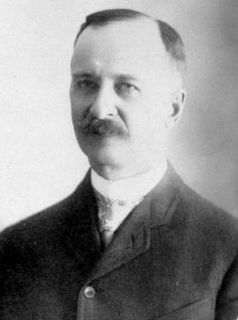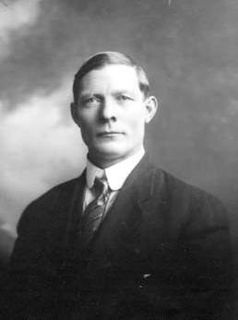The 1913 municipal election was held December 8, 1913 to elect a mayor and five aldermen to sit on Edmonton City Council, trustees to sit on the public school board, and four trustees to sit on the separate school board.
The 1917 municipal election was held December 10, 1917, to elect a mayor and seven aldermen to sit on Edmonton City Council and four trustees to sit on each of the public and separate school boards. There were also two plebiscite questions asked.
The 1919 municipal election was held December 8, 1919 to elect a mayor and five aldermen to sit on Edmonton City Council and four trustees to sit on the public school board. T P Malone, Paul Janvrin, T S Magee, and Joseph Henri Picard were acclaimed to two-year terms on the separate school board. In the election's only plebiscite, Edmontonians rejected a proposal to pay their aldermen.
The 1920 municipal election was held December 13, 1920, to elect a mayor and six aldermen to sit on Edmonton City Council and three trustees to sit on the public school board. J Cormack, Joseph Gariépy and J J Murray were acclaimed to two-year terms on the separate school board. In the election's only plebiscite, Edmontonians rejected a proposal to pay their aldermen for the second consecutive election.
The 1921 municipal election was held December 12, 1921 to elect a mayor and seven aldermen to sit on Edmonton City Council and four trustees to sit on the public school board. F A French, Paul Jenvrin, Thomas Magee, and Joseph Henri Picard were acclaimed to two-year terms on the separate school board.
The 1923 municipal election was held December 10, 1923 to elect a mayor and six aldermen to sit on Edmonton City Council and four trustees to sit on the public school board. Robert Crossland, Paul Jenvrin, Thomas Magee, and Joseph Henri Picard were acclaimed to two-year terms on the separate school board.
The 1924 municipal election was held December 8, 1924 to elect a mayor and five aldermen to sit on Edmonton City Council and three trustees to sit on each of the public and separate school boards.
The 1925 municipal election was held December 14, 1925 to elect a mayor and seven aldermen to sit on Edmonton City Council and four trustees to sit on each of the public and separate school boards. In the election's only plebiscite, the voters also rejected a proposal to increase the mayor's term from one year to two.
The 1926 municipal election was held December 13, 1926, to elect a mayor and six aldermen to sit on Edmonton City Council and three trustees to sit on the public school board. Harry Carrigan, J O Pilon, and W D Trainor were acclaimed to two-year terms on the separate school board.
The 1927 municipal election was held December 12, 1927 to elect a mayor and five aldermen to sit on Edmonton City Council and four trustees to sit on each of the public and separate school boards. There were also two plebiscite questions.
The 1928 municipal election was held December 10, 1928 to elect a mayor and six aldermen to join Edmonton City Council and three trustees to join the public school board during the year of 1929 and 1930. Three trustees were elected by acclamation to join the separate school board for 1929 and 1930.
The 1929 municipal election was held December 9, 1929 to elect a mayor and five aldermen to sit on Edmonton City Council and four trustees to sit on the public school board, while four trustees were acclaimed to the separate school board). In the election's only plebiscite, voters didn't endorse the extension of the half day Wednesday shopping holiday by the required two-thirds majority.
The 1930 municipal election was held November 12, 1930 to elect a mayor and five aldermen to sit on Edmonton City Council and four trustees to sit on the public school board, while three trustees were acclaimed to the separate school board. This was the first election to be held in November; where elections had previously been held on the second Monday of December, beginning in 1930 they were held on the second Wednesday of November to encourage voter turnout.
The 1931 municipal election was held November 11, 1931 to elect a mayor and five aldermen to sit on Edmonton City Council and four trustees to sit on the public school board, while four trustees were acclaimed to the separate school board.
The 1934 municipal election was held November 14, 1934 to elect a mayor and six aldermen to sit on Edmonton City Council and three trustees to sit on each of the public and separate school boards.
The 1935 municipal election was held November 13, 1935 to elect a mayor and five aldermen to sit on Edmonton City Council and four trustees to sit on the public school board, while four trustees were acclaimed to the separate school board. Voters also approved a requirement that candidates for city council be required to own property.
The 1936 municipal election was held November 12, 1936 to elect a mayor and five aldermen to sit on Edmonton City Council and three trustees to sit on the public school board, while three trustees were acclaimed to the separate school board. Voters also rejected a proposal to extend the mayor's term to two years. The election would normally have been held on November 11, but was delayed by a day owing to the Armistice Day holiday.
The 1942 municipal election was held November 12, 1942 to elect a mayor and five aldermen to sit on Edmonton City Council, three trustees to sit on the public school board and five trustees to sit on the separate school board. Voters also approved an eight-hour day for firefighters. The election would normally have been held on November 11, but was delayed by a day owing to the Armistice Day holiday.
The 1952 municipal election was held October 15, 1952 to elect five aldermen to sit on Edmonton City Council and three trustees to sit on the separate school board, while three trustees were acclaimed to the public board. There was no election for mayor, as William Hawrelak was halfway through his two-year term. The electorate also decided four plebiscite questions.
The 1962 municipal election was held October 17, 1962 to elect five aldermen to sit on Edmonton City Council and three trustees to sit on each of the public and separate school boards. The electorate also decided two plebiscite questions. No election for mayor was held because Elmer Roper was one year into a two-year term.





